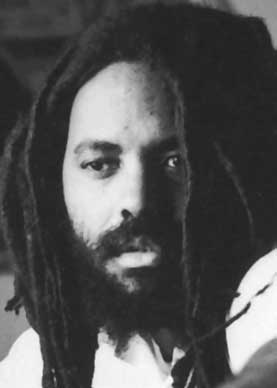![]()
Write us!
[email protected]
Embedded Press, or Just in Bed?
By Mumia Abu Jamal
In times of war or other great emotional issues, the nature of the press is always evident. One need only read, watch or listen to the cadences and rhythms of speech, to learn what slant the media is placing on a story (and there is always a slant!).
In this war, the slant is as obvious as old Jimmy Durante’s  nose. Every reporter who wants to keep his job must bury all of her serious misgivings or questions about the war, or risk what happened to Peter Arnett, an award-winning veteran reporter of the first Gulf War. Arnett, on assignment for the latest Gulf Folly... er, I mean, War, for NBC, MSNBC, and the National Geographic magazine, got fired for daring to go on Iraqi TV and to speak his honest mind about what he saw, and heard, and thought about the war he was covering. Arnett, aired by fuzzy Iraqi TV, offered the opinion that Americans misjudged the stiff resistance they would receive in Iraq, and offered the view that the bigwigs had to rethink how to wage the war. His bosses promptly pulled the plug on his performance, and for a moment, Arnett seemed contrite, telling one broadcast audience that he “clearly [made] a misjudgment.”
nose. Every reporter who wants to keep his job must bury all of her serious misgivings or questions about the war, or risk what happened to Peter Arnett, an award-winning veteran reporter of the first Gulf War. Arnett, on assignment for the latest Gulf Folly... er, I mean, War, for NBC, MSNBC, and the National Geographic magazine, got fired for daring to go on Iraqi TV and to speak his honest mind about what he saw, and heard, and thought about the war he was covering. Arnett, aired by fuzzy Iraqi TV, offered the opinion that Americans misjudged the stiff resistance they would receive in Iraq, and offered the view that the bigwigs had to rethink how to wage the war. His bosses promptly pulled the plug on his performance, and for a moment, Arnett seemed contrite, telling one broadcast audience that he “clearly [made] a misjudgment.”
Before nightfall, however, the New Zealand-born naturalized U.S. citizen had signed on board London’s Daily Mirror, a paper not known for softening its positions to praise the Bush-Blair war aims. Credentialed by the Mirror to work as Baghdad correspondent, Arnett’s tone hardened: “I report the truth of what is happening in Baghdad and will not apologize for it.” (USA Today April 1). While the Mirror is certainly to be commended for a great catch, the real story is the ease and speed with which the Pulitzer prize-winning journalist was dispatched from his former posts.
Clearly, Arnett had violated the “rules.” What rules? Don’t suppose for a second that it is somehow anathema for a reporter to have, and occasionally to express one’s opinions. Journalists do such things everyday. Does anyone seriously think that Arnett would’ve been canned had he opined that the War was a glorious attempt to “liberate” the oppressed Iraqis from the dastardly clutches of the evil tyrant Saddam?
Arnett wasn’t fired for expressing an opinion; he was fired for expressing an opinion that was critical of the U.S. Imperial Army; one that did not accord with the wishes of the White House.
He broke an unwritten, yet still potent rule; and you’d better believe that every journalist under 40 years old understood it with fear, and trepidation.
The Rule? Know which way your bosses feel—and don’t piss them off.
The Sub-Rule? Don’t dare go against those in Power, for your career may be crippled. Luckily, for Arnett, he is a rare commodity. He is a Pulitzer prize winner. Luckier still, the Mirror is editorially opposed to the Iraqi Adventure.
Even still, you can bet that Arnett had his moments of gripping fear, and not from Iraqi Scuds, or fedayeen suicide squads; but from the bosses of the media outlets that he worked for.
Have you heard any protests from his “fellow journalists,” who feel that their colleagues should be entitled to speak their mind, on occasion? Don’t hold your breath.
Witness the “embedded media”; reporters who travel, eat, live with and dress like the soldiers. Under such conditions, while they may get pictures and stories, their very proximity insures that they will not be able to truly be objective, for they will over-identify with their daily associates, and their stories will be tainted by their associations. The “embedded media” is a prize for the Government; but for viewers, readers and listeners of the media, it is but the latest form of Pentagon-approved propaganda. News in form, but not in content. For the very essence of news has historically been the critical questioner of those in power. Ask yourself, how much critical questioning have you seen since the bombs began to fall? How much cheerleading? And that’s the point.
Peter Arnett questioned the status quo, and because he voiced a position contrary to government dictates, he was shown the door. A chill rolls through the press corps. They get the message. The tragedy is that the American people won’t.
—Copyright 2003, Mumia Abu-Jamal
Write us
[email protected]